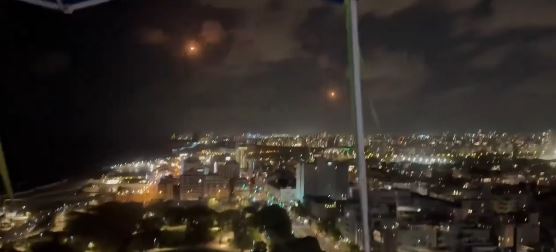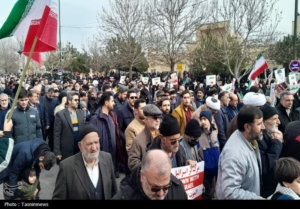On Tuesday, Tehran launched missile attacks on Israel, marking a direct retaliation for the recent assassinations of key leaders from Hamas, Hezbollah, and the Islamic Revolutionary Guard Corps (IRGC). The IRGC issued a statement explaining the reasons behind the strikes, linking them explicitly to the deaths of these prominent figures.
Sky News captured this live. Iran launched missiles at Isreal. pic.twitter.com/J0kjRwU0rY
— Mukhtar (@I_amMukhtar) October 1, 2024
According to reports from the Israel Defense Forces (IDF), several hundred ballistic missiles were fired, though the IDF claims to have intercepted the majority of the incoming projectiles.
“In response to the martyrdom of Ismail Haniyeh, Sayyed Hassan Nasrallah and the martyr Nilforoshan, we struck at the heart of the occupied territories,” the IRGC said in a statement released about 30 minutes after the first missiles struck.
Tehran’s official line, as expressed by the IRGC, points directly to the assassinations of three high-ranking figures: Ismail Haniyeh, Sayyed Hassan Nasrallah, and Brigadier General Abbas Nilforoshan. This attack on Israeli territory is being framed by Iranian leadership as a justified reaction to what they describe as targeted killings of their allies and officials.
Ismail Haniyeh, who led Hamas, was killed in Tehran in early August, while Sayyed Hassan Nasrallah, long-serving leader of Hezbollah, died in an Israeli airstrike just last week. The third figure, Brigadier General Abbas Nilforoshan, the IRGC’s deputy commander of operations, was meeting with Nasrallah when Israeli airstrikes demolished a building in Beirut, where they were located.
The gravity of the retaliation is highlighted in the IRGC’s messaging, which suggests that should Israel respond militarily, Iran’s next wave of attacks will escalate in intensity.
“If the Zionist regime responds to our attack, our next strikes will be more destructive,” the statement warned.
The missile attack and Tehran’s stance have drawn a variety of responses. Notably, Iran’s mission at the United Nations also issued a formal statement addressing the missile strikes and Iran’s rationale.
“Iran’s legal, rational, and legitimate response to the terrorist acts of the Zionist regime—which involved targeting Iranian nationals and interests and infringing upon the national sovereignty of the Islamic Republic of Iran—has been duly carried out. Should the Zionist regime dare to respond or commit further acts of malevolence, a subsequent and crushing response will ensue,” the mission stated in a post on X.
From the Iranian perspective, the missile strikes are not merely a symbolic gesture but a legitimate defensive response to what they view as provocations and breaches of sovereignty. This narrative frames the strikes as a reaction to “terrorist acts” committed by Israel, specifically targeting individuals who hold significant roles within Hamas, Hezbollah, and the IRGC.
All the Israelis trying to downplay this attack, are doing so because they don’t want to retaliate against Iran.
Compare that to their exaggeration of Oct 7. pic.twitter.com/UQCAZY1Ul5
— Syrian Girl 🇸🇾 (@Partisangirl) October 1, 2024
As tensions escalate, many eyes are now on Israel’s next move. Will the Israeli government choose to retaliate, and if so, what will the consequences be for an already volatile region? The IRGC has made clear that any Israeli military action in response to these missile strikes could trigger even more severe violence, making the situation precarious for both sides.

















